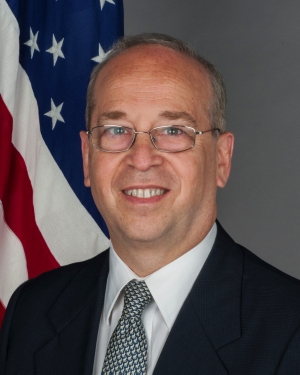'I Equate the BRI to a Rorschach Test'
Asia Society Policy Institute Vice President Daniel Russel on the BRI in Southeast Asia and local engagement beyond top level government

Image: S. Jung / Asia Society Switzerland
©Asia Society Switzerland
The need for early engagement of local stakeholders: Asia Society Policy Institute Vice President Daniel Russel on the Belt and Road Initiative in Southeast Asia.
What exactly is the Belt and Road Initiative (BRI)?
The Belt and Road Initiative is President Xi Jinping’s signature foreign and economic policy. Enshrined in the Communist Party constitution, the BRI is a Chinese-led infrastructure development effort spanning across more than 70 countries seeking to foster economic development, bolster connectivity, and facilitate trade. However, the answer to what exactly is the BRI needs to be further unpacked, especially since the initiative is still opaque. Some see the BRI as China’s benevolent effort to deliver much-needed infrastructure development and financing to support emerging economies, and on the other side of the spectrum, as a nefarious Chinese geopolitical and economic strategy to entrap and influence states. I equate the BRI to a Rorschach test: one’s perceptions of the BRI are indicative of one’s sentiments towards China.
Will we still talk about BRI in 20 years?
Infrastructure projects have a long lifecycle stretching to over 50 years in some cases, and with the scale of some of the high-profile projects, the BRI will still be a topic of discussion and will have a lasting impact. Grand infrastructure projects, whether it be the roads built by the Romans or the U.S. Marshal Plan following World War II, have a profound effect on the countries and communities in which they are developed far beyond their initial goal or timeframe. That is why it’s critical that China and recipient countries get the projects right during the preparation and design stage of the project’s lifecycle.
You have just returned from a research trip to Southeast Asia where China is present a lot with investments in railroads and ports as well. What is the main conclusion that you brought home from that trip?
One of the most salient points that we took away was the importance of engaging local stakeholders and communities in the project host state and to begin doing so in the earliest stages of the project. As we’ve seen with the rise in protests against BRI projects, engagement with local communities and stakeholders facilitates their buy-in with the project and BRI and is critical for the long-term sustainability and success of the project.
How sustainable are these investments?
It certainty depends on which project one looks at. For instance, looking at the Kunming to Vientiane High-Speed Rail, it’s hard to imagine the railway is going to be fiscally viable considering the size of the local population and level of per-capita income. In order to stem economic losses and to ensure long-term financial sustainability, Beijing will need to ensure that projects going forward are structured on sound economic footing and open to international public and private capital and participation.
The investments in Southeast Asia by China have been called "debt trap diplomacy" or "new colonialism." Do you consider it an intentional strategy or not?
When looking at the BRI, there’s certainly a sense of intentionality and haphazardness operating in tandem. Undeniably, projects in Sri Lanka, Malaysia, the Maldives, and a slew of other host countries are confronting mounting debts from the BRI. But simultaneously, we’ve witnessed that BRI projects range in efficiency and effectiveness, with developers operating under little oversight or fear of disciplinary action, a situation which does not encourage the application of infrastructure development best practices and standards. It seems clear that China does not shrink from using loans, debts and other economic tools for leverage and strategic objectives. However the "debt trap diplomacy' allegations may give China undue credit for being strategic, given the many instances of poor planning and the lack of risk analysis that has led to project failure.
Will the recent backlash of some BRI projects affect future investments?
The high-profile delays and cancellation of projects have unquestionably signaled to both the public and private sectors — in China and internationally — the risks associated with the BRI. There’s a growing awareness in Beijing that unless the BRI reforms in a manner that makes projects accessible and appealing to private investment, the initiative will continue to be enmeshed in failed projects and controversies.
How can the Chinese government deal with changing administrations in recipient countries?
Governments come and go, especially in multiparty systems, making it critical for Beijing, its SOEs, and Chinese companies to engage with local stakeholders and communities early and often. Projects have been slowed down or even halted by community protests. Local stakeholder support is a critical factor in supporting a successful and sustainable project.
Do you consider the BRI to be a peaceful initiative — i.e. the old liberal dream of pacifying everything through trade, but realized through a socialist state?
It’s peaceful in the sense that China is not forcing states to implement infrastructure development, but there are concerns over the potential militarization of some infrastructure projects. For example, there are wide-ranging concerns over port development and the possibility for dual-use deepwater ports, in which China could utilize these ports for naval purposes. The ports in Gwadar, Pakistan, and Kyuakphyu, Myanmar are emblematic of these concerns.

Daniel R. Russel is Vice President for International Security and Diplomacy at the Asia Society Policy Institute (ASPI). Previously he served as a Diplomat in Residence and Senior Fellow with ASPI for a one year term. A career member of the Senior Foreign Service at the U.S. Department of State, he served as the Assistant Secretary of State for East Asian and Pacific Affairs. Prior to his appointment as Assistant Secretary, Mr. Russel served at the White House as Special Assistant to the President and National Security Council (NSC) Senior Director for Asian Affairs.
Serena Jung is Program Manager at Asia Society Switzerland.
This interview is part of Asia Society Switzerland's interview series on China's «Belt and Road Initiative» and has been conducted in writing. Find all the interviews and other content about the BRI here.

